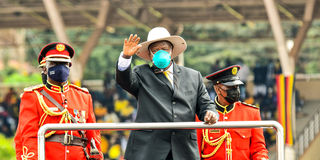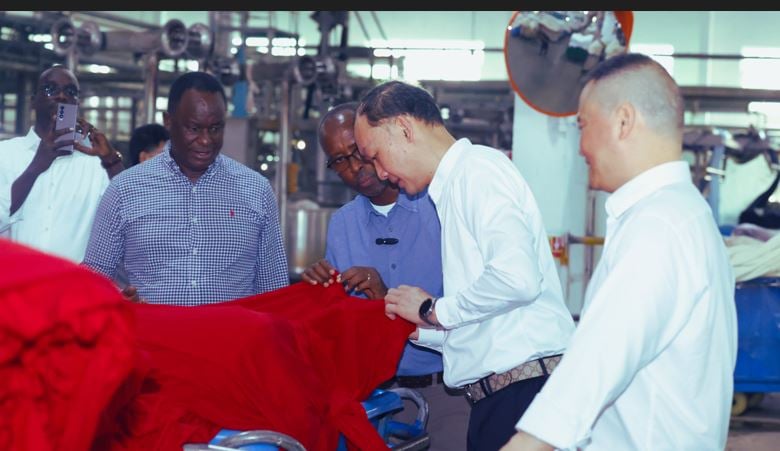How President Museveni should get it right in this term

President Museveni addresses guests during his Inauguration ceremony on May 12, 2021 at Kololo ceremonial grounds. PHOTO/DAVID LUBOWA
What you need to know:
Rebooting economy. A look at the key issues President Museveni must focus on to get the economy going in the next five years. He must find ways of stimulating the economy whose growth has dropped to 2.9 per cent - the lowest level in 20 years.
President Yoweri Tibuhaburwa Kaguta Museveni’s work seems cut out over the next five years.
With his experience, thanks to his longevity in power, President Museveni doesn’t need a feasibility study to understand the nature and magnitude of what he has to confront in the next five years to shape the economy that works for everybody.
After being sworn in last week on Wednesday, Mr Museveni started in earnest a journey that will see him serve this country as President for 40 years, making him by far the longest serving Head of State Uganda has ever had.
In terms of the economy, he is not expected to “fundamentally” divert from the line which he has been pursuing over the last 35 years of his presidency.
With the exception of harnessing information technology (IT), all the other drivers of growth and development that President Museveni will pursue vigorously, including commercialisation of agriculture, promoting regional integration and trade in addition to harnessing industrialisation (import substitution and value addition), are scribbled in the original National Resistance Army (NRA) 10 point programme, given birth to 40 years ago.
Shifting goal posts
Whereas on paper the aforementioned points are engraved as key issues to be tackled, previous experience indicates otherwise.
According to some analysts, the next five years will be no different from the previous terms.
“National Development Plan II was supposed to usher in the country into middle income status, but that didn’t happen,” Mr Siragi Magara Luyima, a policy specialist said last week in an interview. So the dream to achieve the per capita income, also known as income per person, in the range of $1,000 (about Shs3m) continues. Currently, Uganda’s per capita income is just $733.
He continues: “I hope this happens in the next five years alongside a deliberate move to enhance human capital development which remains a challenge to the government.”
With uptake of human capital development, productive utilisation of numerous infrastructure will cease to be an issue as it has been over the last decades.
But President useveni Must find ways of stimulating the economy whose growth has since dropped to 2.9 per cent - the lowest level in 20 years. While doing so, Small and Medium Enterprise (SMEs) should be the key beneficiaries.
Part of the plan should include incentives and funding of the SMEs who make up the biggest segment of the economy in addition to being the largest employers.
The economy had already been growing slowly only to worsen by Covid-19 related effects. Uganda is estimated to have grown by 3.1 per cent by June 30, 2020, slower than the of 5.4 per cent five-year average, according to government statistics.
More efficiency, according to the policy analysts, in utilisation of public resources should be a matter of urgency.
Huge investment in security, he says is not the way to go but rather more returns on investment will be realised if more resources are injected in health, education and trade sectors.
Weak private sector
Although government has been reclaiming its role in economic growth and development as evidenced by the increasing role of Uganda Development Bank and Uganda Development Corporation in driving the economy, the private sector - a substantial number of whom are foreigners (foreign investors) still lead the economy at the expense of the weak domestic investors/entrepreneur.
Ms Jane Seruwagi Nalunga, an expert on trade, tax and investment related issues, want to see President Museveni redefines the aforementioned approach in the next five years.
Ms Nalunga who is also the executive director of Southern and Eastern Africa Trade Information and Negotiations Institute – (SEATINI) Uganda, says a private sector-led economy on its own is incapable of succeeding, something the Private Sector apex leadership in the country concurs with.
Ms Nalunga who has more than twenty years of experience in policy research, analysis and advocacy in addition to authoring a number of policy oriented studies and articles, notes that government must play a more active role in developing the economy than it has done over the last 35 years if it wants to ‘secure the future’ for Ugandans.
But first, she says, the government must secure its policy space, then use it to grow the economy. It should close the inequality gap that has been widening over the years before being complicated by the Covid-19 pandemic in the last 14 months. The effects of Covid-19 is expected to worsen Uganda’s poverty levels, with at least 2.6 million people expected to slip into poverty in addition to the eight million, who had been below the poverty line pre-Covid-19, according to UBOS report.
In the next five years with President Museveni at the helm again, Ms Nalunga expects his government to halt exporting raw produce. While this is being enforced, uptake in adoption of standards in agriculture and trade must be enhanced and linked to industries as well.
Boosting agriculture
Being an agricultural-powered economy, President Museveni should invest in proper storage facilities such as well-ventilated warehouses to attract better prices.
With the Covid-19 effects still weighing heavily on MSMEs, Uganda Development Bank’s method of operation should be redirected towards addressing the needs of the sector that provides the biggest employment in the country—in excess of 2.5 million according to available studies.
Ms Nalunga also believes it is time to establish a national bank , arguing that with Uganda Commercial Bank, funding challenges for business will be a thing of the past.
She says: “With our bank, it will be much easier to mobilise resources for onward lending and at cheaper rates than those in foreign commercial banks.”
Researcher Paul Corti Lakuma, couldn’t agree more with Ms Nalunga. The difference, however, is that the Economic Policy Research Centre (EPRC) senior research fellow thinks that government doesn’t have to necessarily own a financial institution, but create an environment where it should be easier for locals to own and run a commercial bank.
Before that, Ms Nalunga warns against ending up as supermarket for the continental market- African Continental Free Trade Area (AfCTA). Ugandans should be active players—with something to offer to the continent.

Traders with their merchandise operating along Luwum street on July 14, 2020. With the Covid-19 effects still weighing heavily on MSMEs, Uganda Development Bank’s method of operation should be redirected towards addressing the needs of the sector that employs over 2.5 million people. PHOTO/KELVIN Atuhaire
Public debt
President Museveni who in a way is banking on ‘oil money’ once commercial oil begins to flow, does not seem worried by the spiraling debt. He is on the record for having said the country’s debt is sustainable. He is yet to go slow in huge investment in infrastructure which account for most of the Shs66 trillion debt the country has contracted.
Makerere University School of Economics lecturer and economist Dr Fred Muhumuza, believes there is need to put a stop on heavy infrastructure investment in favour of human capital investment, education and health sector.
As public debt shoots up, revenue collection continues to decline, this time on the account of Covid-19.
With barely 40 days to go before the close of the financial year, Uganda Revenue Authority is in a race to raise Shs6 trillion. It looks like for the second time in as many financial years, the revenue collection accounts could close with a shortage in excess of Shs3 trillion.
The only way to deal with the dwindling revenue collection is by expanding the tax base which remains narrow, burdening formal sector employees as those plying their trade in the informal sector and earning taxable income walk away ‘scot free.’
Studies have found that despite Uganda Revenue Authority’s (URA) innovations, a small percentage of Ugandans pay tax. A number of commodities in Uganda are under-taxed due to slackness among what President Museveni refers to as “our tax officials and policymakers.”
Government has since put in place a five-year domestic revenue mobilisation strategy to raise the tax-to-GDP ratio to 16 per cent by 2023. Some studies indicate that Uganda could raise tax revenue up to 23 per cent of Gross Domestic Product annually if leakages are reduced and revenue administration systems efficiency is improved.
Double Taxation Agreements
Then there are Illicit Financial Flows (IFF). URA is losing millions of US dollars in tax because of aggressive transfer pricing practices and abuse of tax treaties by several multinationals corporations operating in Uganda.
Ms Nalunga believes President Museveni should urgently put this to an end by reviewing the Double Taxation Agreements (DTAs) signed so far especially with tax haven jurisdiction.
Should commercial production of oil and gas begins before government tightens loopholes that drives illicit financial flows (IFFs), the country should expect very little and in some cases nothing in oil revenue.
This is because the oil resource is extremely susceptible to IFFs maneuvers.
This is well exemplified in several studies including one by the United Nations Conference on Trade and Development (UNCTAD).
According to the report, IFFs related to the export of extractive commodities (amounting to $40 billion in 2015, which is about Shs147 trillion) remains the largest component of illicit capital flight from Africa.
Illicit Financial Flows which is increasingly becoming a real challenge to revenue mobilisation, refers to movements of money and assets across borders which are illegal in source, transfer or use, according to the report entitled “Tackling illicit financial flows for sustainable development in Africa.”
Mostly, IFFs which deny the country its fair share of revenue, are being perpetuated by the multinational companies operating across the country’s economic sector, with key amongst which include players in sectors such as oil and gas (extractive), energy, telecommunication, ICT and manufacturing.
Every year, an estimated $88.6 billion (about Shs325 trillion), equivalent to 3.7 per cent of Africa’s GDP, leaves the continent of Africa as illicit capital flight, according to UNCTAD’s Economic Development in Africa Report 2020.
In Uganda, it is estimated that more than Shs2trillion - about three quarters of the general national budget support by development partners (donors) for this financial year (2020/2021), amounting Shs2.9 trillion, is lost as a result of IFF.
Further, UNCTAD’s Economic Development in Africa Report 2020 says stopping illicit capital flight even for the case of Uganda could almost cut in half the annual financing gap of $200 billion (about Shs733 trillion) that the continent of Africa faces to achieve the Sustainable Development Goals (SDGs).
Mostly, IFFs are being perpetuated by the multinational companies either operating or with presence in the country.
Revenue collection
Widen tax base
With barely 40 days to go before the close of the financial year, Uganda Revenue Authority is in a race to raise Shs6 trillion. It looks like for the second time in as many financial years, the revenue collection accounts could close with a shortage in excess of Shs3 trillion.
The only way to deal with the dwindling revenue collection is by expanding the tax base which remains narrow, burdening the formal sector employees as those plying their trade in the informal sector and earning taxable income walk away ‘scot free.’





